MARS fact sheets
The MARS project puts emphasis on practical outputs and the dissemination of scientific findings, allowing to establish strong linkages between the scientists and the practitioners 'on the ground'. One particular aim of the MARS communication and dissemination strategy is to encourage the scholars to leave their ‘ivory tower’ and to propagate their knowledge in a digestible format. The fact sheets are designed as “quick feeds” for a diverse target-audience, including academics, administrators, practitioners and policy-makers. Each fact sheet is written in a non-technical language of brief and concise style, not exceeding two pages in length.
#01 MARS terminology

In order to foster the communication process and to harmonize the MARS approaches and outputs, the project requires agreement on a common terminology. This contribution is designed as a ‘living document’, harmonizing the terminology by defining the term Stressor and the components of the DPSIR conceptual framework (EEA 1999), i.e. Driver, Pressure, State, Impact and Response. To allow for a streamlined analysis of multistressor interactions, MARS adopts the systematic classification for defining synergistic and antagonistic effects of Piggott et al. (2015).
#02 Multiple stresses and freshwater ecosystem service provision

The MARS ‘cookbook’ methodology
The MARS project assesses the impacts of multiple stressors on the provision of ecosystem services from freshwater ecosystems, under different climatic and land-use scenarios. The European Union FP7 funded project has developed an innovative new assessment methodology – termed a ‘cookbook’ – to allow scientists, environmental managers and policy makers to quantify the relationships between multiple stresses and ecosystem service provision and value. The cookbook provides an invaluable tool to support the implementation of the Water Framework Directive in Europe.
#03 Freshwater Information Platform
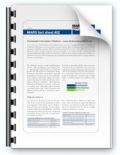
www.freshwaterplatform.eu
Over recent years, many European Union funded research projects have investigated freshwaters – ranging from biodiversity related projects to others focusing on pressures and their effects on European inland waters, including appropriate rehabilitation strategies. However, the data generated by these projects is often difficult for water managers, policy makers, scientific communities and the general public to access and use. In order to make this detailed and wide-ranging knowledge of freshwater ecosystems accessible to all, the Freshwater Information Platform was launched: an interactive website integrating results and original data stemming from finished, on-going, and future freshwater research projects.
#04 MARS scenarios and storylines
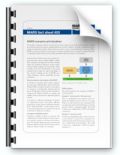
The multiple combinations of drivers and pressures for a given aquatic system for the current situation are shaped by its historical and present climatic, managerial and socio-economic conditions. The future combinations of drivers and pressures depend on the future climatic and socio-economic scenarios considered plausible for this system. Within MARS, scenarios and storylines are used to project the impacts of multiple stressors on aquatic ecosystems. They deliver a qualitative framework and, where possible, quantitative data for modellers to run simulations.
#05 Multiple stresses on Europe’s freshwaters
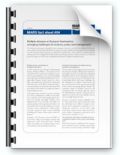
Emerging challenges for science, policy and management
The interactions and impacts of multiple stressors on aquatic ecosystems is one of the key challenges for freshwater science, policy and conservation. Whilst there are many success stories of pollution being reduced on rivers and lakes across the continent, Europe’s freshwaters are still subject to multiple stresses, many of which are complex and poorly understood. In order to safeguard the health and diversity of Europe’s freshwaters, and the ecosystem services that they provide to humans, we need to better understand and manage the challenge of multiple stressors.
#06 The Freshwater Blog
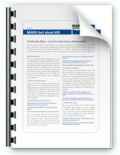
A tool for wide range dissemination
With the start of MARS one of the first tasks was to transition the blog from the BioFresh project to the MARS project, involving a renaming and rebranding of the site and associated social media. Since then, one blog post on freshwater science, policy or conservation was published on a weekly basis. The blog is an excellent tool for a wide spread dissemination and communication and to reach a large group of readers all over the world.
#07 HyTEC: investigating the effects of pulse releases of water from hydropower on aquatic life
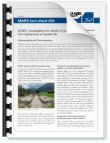
Hydropower plants often produce electricity in response to energy demands. This means that their energy production can be intermittent and changeable, which in turn causes pulse releases of water downstream into river systems.
A team of researchers from the European Union MARS Project are carrying out ongoing experiments on the effects of hydropeaking and combinations of hydropeaking and thermopeaking on aquatic life at a facility known as HyTEC close to Lake Lunz in the Austrian Alps.
#08 Provisioning Freshwater Ecosystem Services
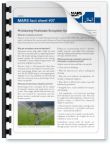
What are provisioning ecosystem services?
Provisioning services encompass all the outputs of materials, nutrients and energy from an eco-system. These might include food and water supplies, raw materials for construction and fuel, genetic resources, medicinal resources and ornamental resources. Human use of provisioning services is therefore usually extractive, and ranges from subsistence hunting, fishing and gathering to industrial agri- and aqua-cultural systems.
#09 Regulating and Maintaining Freshwater Ecosystem Services

What are regulating and maintaining ecosystem services?
These are services that regulate and maintain ecosystem processes, and in so doing, support ecosystem functioning and productivity. Regulating and maintaining services describe the ways in which living organisms can mediate or moderate their environments in ways that benefit human well-being.
#10 Cultural Freshwater Ecosystem Services

What are cultural ecosystem services?
Cultural ecosystem services are the non-material benefits that people obtain from ecosystems through recreation, tourism, intellectual development, spiritual enrichment, reflection and creative and aesthetic experiences.
#11 Storylines: writing the future for effective water management
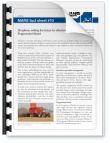
Fragmented World
As water management is usually site-specific, global data and predictions currently tells us little about water management in the future. Projections and data do tell us, however, about aggregate global demand and availability.
The storylines designed by MARS scientists use this data and create further predictions around potential changes such as technologies for irrigation, changes in river discharges, changes in pesticide use (and thus pollution), technologies like dikes and dams, water use in industry and energy production, and use of surface and groundwater.
#11 Storylines: writing the future for effective water management
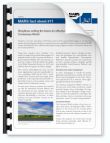
Consensus World
As water management is usually site-specific, global data and predictions currently tells us little about water management in the future. Projections and data do tell us, however, about aggregate global demand and availability.
The storylines designed by MARS scientists use this data and create further predictions around potential changes such as technologies for irrigation, changes in river discharges, changes in pesticide use (and thus pollution), technologies like dikes and dams, water use in industry and energy production, and use of surface and groundwater.
#12 Storylines: writing the future for effective water management
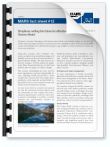
Techno World
As water management is usually site-specific, global data and predictions currently tells us little about water management in the future. Projections and data do tell us, however, about aggregate global demand and availability.
The storylines designed by MARS scientists use this data and create further predictions around potential changes such as technologies for irrigation, changes in river discharges, changes in pesticide use (and thus pollution), technologies like dikes and dams, water use in industry and energy production, and use of surface and groundwater.
#13: The MARS Diagnostic Analysis Tool (DAT)

The MARS Diagnostic Analysis Tool (DAT)
To improve ecological status and to derive appropriate management and restoration options, it is necessary to know the causes of ecological degradation. Yet, often the ecological assessment does not identify the causes itself. Here, the MARS DAT provides a tool to ll this gap. It is a diagnostic tool that aims to help water body managers identify and rank potential causes of ecological degradation at the scale of individual water bodies.
#14 Four key messages of the MARS project
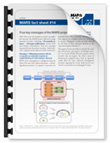
Four key messages of the MARS project
After four years of in-depth research on multiple stressors, the MARS project delivered a large quantity of results, including > 50 scientifc reports, > 150 paper publications, various tools and further achievements. Four key messages emanated from the project activities, which provide a quintessential summary of the endeavours.
